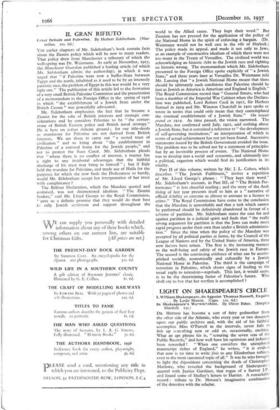IL GRAN RIFIUTO
Creat Britain and Palestine. By Herbert Sidebotham. (Mac- millan. los. 6d.)
Tim earlier chapters of Mr. Sidebotham's book contain facts about the Zionist policy which will be new to many readers. That policy drew from Manchester a tributary of which the well-spring was Dr. Weizmann. As early as November, 1915, the Manchester Guardian published a leading article (of which Mr. Sidebotham admits the authorship), in which it was urged that "if Palestine were now a buffer-State between Egypt and the north, inhabited as it used to be by an intensely patriotic race, the problem of Egypt in this war would be a very light one." The publication of this article led to the formation of a very small British Palestine Committee and the presentation of a memorandum to the Foreign Office in the spring of 1916 in which "the establishment of a Jewish State under the British Crown" was powerfully advocated.
Mr. Sidebotham emphasises the fact that he became a Zionist for the sake of British interests and strategic con- siderations and he considers Palestine to be "the corner- stone of British Eastern policy and British naval strategy." He is here on rather delicate ground ; for our title-deeds as mandatory for Palestine are not derived from British interests. We are there to carry out "a sacred trust of civilisation" and to bring about "the establishment in Palestine of a national home for the Jewish people," and not to protect the Suez Canal. Mr. Sidebotham pleads that "where there is no conflict of interest, a trustee has a right to any incidental advantages that the faithful discharge of his trust may bring to himself " ; but if Italy held the mandate for Palestine, and made use of Haifa for the purposes for which she now finds the Dodecanese so handy, would Mr. Sidebotham accept her interpretation of her trust with complaisance ?
The Balfour Declaration, which the Mandate quoted and endorsed, was not disinterested idealism. "The Zionist leaders," said Mr. Lloyd George to the Royal Commission, "gave us a definite promise that they would do their best to rally Jewish sentiment and support throughout the
world to the Allied cause. They kept their word." But Zionism has not pressed for the application of the policy of
the National Home in the spirit of enforcing a bargain. (Dr.
Weizmann would not be well cast in the role of Shylock.) The policy made its appeal, and made it not only to Jews,
as an example of constructive idealism of which there were not too many in the Treaty of Versailles. The civilised world was acknowledging an historic debt to the Jewish race and righting an historic wrong. The memorandum which Mr. Sidebotham presented to the Foreign Office spoke explicitly of "a Jewish State," and three years later at Versailles Dr. Weizmann told Mr. Lansing that "a Jewish National Home meant that there should be ultimately such conditions that Palestine should be just as Jewish as America is American and England is English."
The Royal Commission record that "General Smuts, who had been a member of the Imperial War Cabinet when the Deblara- tion was published, Lord Robert Cecil in .1917, Sir Herbert Samuel in 1919 and Mr. Winston Churchill in 1920 spoke or wrote in termi that could only mean that they contemplated the eventual establishment of a Jewish State." On voyait grand cn 1919. As time passed, the vision narrowed. The Mandate, not confirmed until July, 1922, said nothing about a Jewish State, but it contained a reference to " the development of self-governing institutions," an interpretation of which in terms of actual achievement has not yet been found. Successive statements issued by the British Government avoided the issue. The problem was to be solved not by a statement of principles but by an inevitable process of events. The National Home was to develop into a social and economic, and ultimately into a political, organism which would find its justification in its vitality. Part II of this volume, written by me J. L. Cohen, which describes "The Jewish Fulfilment," invites a repetition of Mr. Lloyd George's phrase : "They kept their word." Mr. Sidebotham's account, in Part III, of "The British Per- formance" is less cheerful reading ; and the story of the Arab rising of last year presents itself to him as a "narrative of official debility so extreme as almost to amount to a licence to crime." The Royal Commission have come to the conclusion that the Mandate is unworkable and that a task which cannot be performed should be definitively abandoned in favour of a scheme of partition. Mr. Sidebotham states the case for and against partition in a judicial spirit and finds that "the really strong argument for partition is that the Jews can make more rapid progress under their own than under a British administra- tion." Since the time when the policy of the Mandate was accepted by all political parties at home, by the Council of the League of Nations and by the United States of America, three new factors have arisen. The first is the increasing menace to the well-being and safety of the Jewish race in Europe. The second is the convincing evidence of what can be accom- plished socially, economically and culturally by a Jewish National Home in Palestine. The third is the campaign of terrorism in Palestine, which shows signs of leading to the usual reply to terrorism—reprisals. This last, it would seem, is to be the determining factor of Palestine's future. Who shall cry to her that her warfare is accomplished ?






















































 Previous page
Previous page